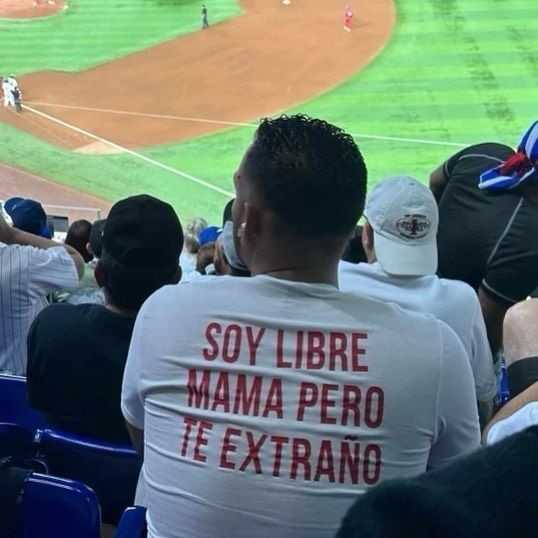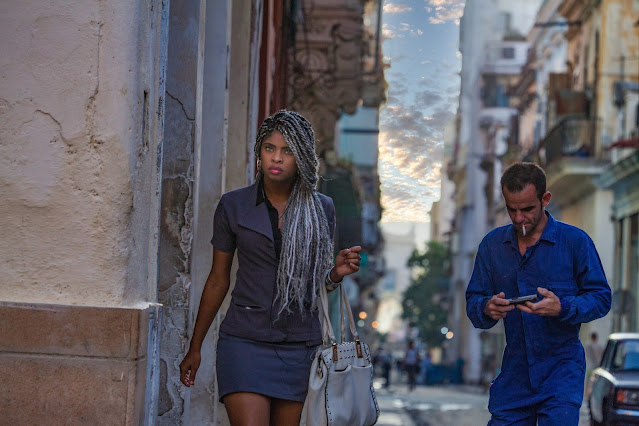My Cuban-American Story with Deeper Conch Roots
Among every list of Castro's greatest crimes committed against the Cuban people appears this one: The Forced Separation of Families. This is the one crime that has affected every single Cuban family since 1959. Before Castro, the Cuban people were free to travel to any place in the world. My grandparents traveled to Miami Beach and New York City in the 40s for their Honeymoon. After 1959, their right to travel - to leave freely to another country for a visit - was no longer an option for the Cuban people. The choice to leave Cuba after 1959 - if you were lucky enough to leave - came with a huge sacrifice. For my paternal grandparents, it came with the sacrifice that they would never see their siblings again and would be forced to live a life in a foreign country without any immediate family members until 1980, with one exception.

In those days, and for centuries prior, it was not uncommon for Cubans to frequent the island of Cayo Hueso, as my grandparents called it. For the first few years of my father's schooling, they lived in Cayo Hueso and visited their other home and family in Cuba annually for my grandmother to renew her teaching license. In 1959, on one of their annual visits, they got stuck in Cuba and were unable to return to Key West with my grandmother because she was a certified teacher and was deemed "a professional" by the Cuban govt. In 1959, the Cuban government denied the Visas of all licensed professionals.
She also often told me another story about the time my 13-year-old father nearly got himself arrested by Castro's men, yet again; this time "for throwing rocks at a movie theatre screen showing a Russian film and yelling 'Comunista! Comunista!'" At least that was the story Abuela told and retold, but my father remembers it very differently. He remembers being arrested by Castro's men for simply standing in line at the movie theatre to watch a Frankie Avalon movie (co-starring Annette Funicello about a beach party). He was detained for a few hours and then allowed to leave with his father, but only after both were given a Communist lecture.
Fortunately for my father, my grandparents had the foresight to know their son's fate would not end well had they stayed in Castro's Cuba. My father attributes his early anti-communist ideology to his own American roots. As an adolescent child in Cuba, he often compared his personal life experiences living abroad to those activities and events he witnessed occurring in his hometown. What he saw happening in Cuba just didn't agree with the way he knew things should be - the way they were in the U.S. Though my grandparents did try to stay - having waited a year before acting on "their" Visas - it was the movie theatre arrest that served as the catalyst for their decision to leave. Perhaps they waited because none of their relatives wanted to leave Cuba in the early 60s. Many Cubans believed Castro when he falsely declared his intention of establishing a democratic government. We all now know that this was one of the many lies he told the Cuban people. Or maybe, like so many others, they were convinced that Castro's revolution would not last long. Immediately after the movie theatre arrest, they took their only child and fled Cuba with only a few belongings they could carry in their suitcases (leaving behind the home they built themselves) and returned to Cayo Hueso on a fake Visa - the city they had once called their second home.
The Forced Separation of Families is perhaps the Cuban government's greatest crime against the Cuban people. Decades of unnecessary suffering, heartbreak, and pain that have resulted from this forced separation of Cuban families is a pain that is inherited by every Cuban child and grandchild in the exile community. This is why we can't stay silent. Our tireless fight for freedom and liberty for Cuba is not only our birthright and legacy but our way of honoring the sacrifices that our grandparents made so that we could live, think and write freely,
Here is an excerpt from a poem titled My Guardian Angelina that I wrote about my Abuela in which I describe her pain from being separated from her family.
“Her love for writing undeniably showedIn the way she regularly wrote
Long, poetic and detailed letters in her impeccable handwriting
To stay connected with her loved ones
Those she was forced to leave behind in Cuba
For a better life for her son, her only son - my father
A life where he could speak his mind without fear
A life where he could not only dream
But live out his wildest dreams
For a life without communism
To leave Cuba in 1961 came with a huge sacrifice
For it meant she'd never see her two sisters and brother again
If I had held the power to change her life for
I’d give her a life without the pain of separation
Separation from her family, her beloved native island paradise
Separation from her teaching career.
This separation has nothing to do with the embargo too. Otherwise why else would the Cuban regime prohibit its people from freely traveling to other countries around the world for leisure? Cuba freely trades with every other country in this world except the U.S. It certainly isn't for a lack of funds as Cubans can easily obtain the necessary resources from their exiled families to do so if they were allowed. It’s because they are not allowed to travel the way international tourists are allowed to travel to Cuba.
The Forced Separation of Families is only one of the many crimes committed against the humanity of the Cuban people by the Cuban regime. During the first era of the Castro regime - the earlier years - Cuban exiles refrained from speaking publicly against the Castro regime - even from the U.S. - for fear that their relatives in Cuba would be persecuted over their actions. This forced separation of families is a tactic of the Cuban govt. used to shackle their people - keep them chained and complicit. It’s also one way that Castro has committed genocide on its people - by attempting to destroy the strong Cuban family values that have traditionally existed and defined the Cuban cultural identity.














Comments
Post a Comment
Please feel free to share your #soscuba story here. If you would like to be featured on this page, please Submit Your Story online at cubanswithwings.com